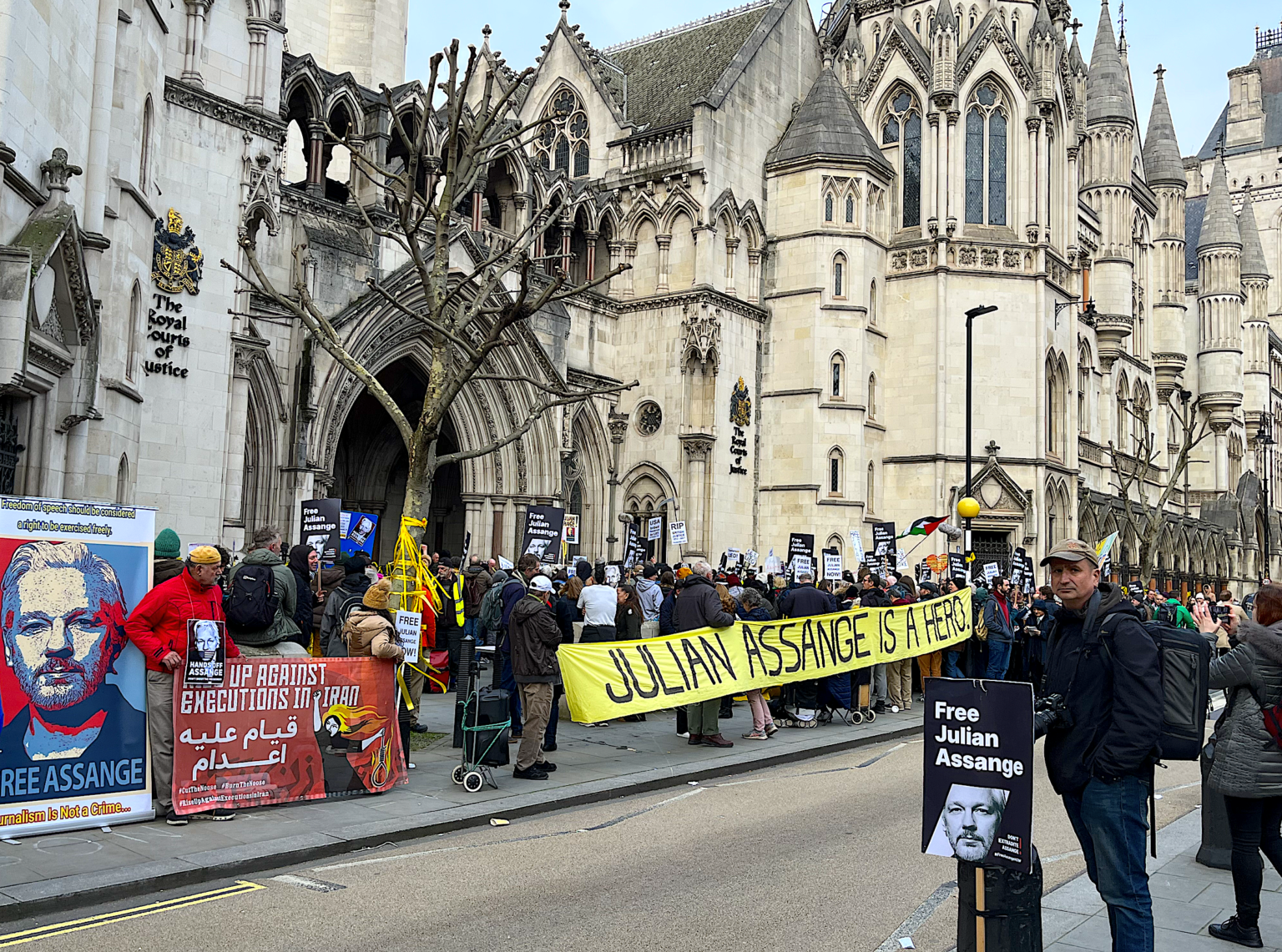March 13, 2024
Speaking from his own experience as an imprisoned whistleblower, Kiriakou reflects on the grim medical outlook for the WikiLeaks publisher if he gets extradited.

Assange supporters outside the Royal Courts of Justice in London during his appeal hearing in late February. (Joe Lauria)
By John Kiriakou
Special to Consortium News
Many of us nervously await news from the High Court of England and Wales on the fate of Julian Assange, hoping against hope that he won’t be extradited to the United States. At the same time, we’re preparing for the worst.
Julian has well-documented medical problems, including a small stroke while incarcerated two years ago. He has consistently received subpar medical care at Belmarsh Prison in the U.K. If anything, that will worsen once he arrives in the United States.
I’ve written recently and extensively about prison medical care in the U.S. It’s terrible. But it bears repeating, especially in light of Julian’s pending extradition. The prison medical system in the United States is utterly broken. People die preventable deaths literally every day and nobody seems to care enough to do anything about it.
A report last year from the Washington Lawyers’ Committee for Civil Rights and Urban Affairs exposed abuses suffered by prisoners at the hands of the federal Bureau of Prisons (BOP), the same entity that would be in charge of Julian’s health.
Forty lawyers and staff members collected evidence of “extreme physical and psychological abuse” in federal prisons. That’s in addition to well-documented failed medical care.
I watched the failure of the prison medical system unfold in real time when I was incarcerated for blowing the whistle on the C.I.A.’s torture program.
I was friendly with a prisoner I’ll call Bill. Bill was 68 years old and doing 30 years for a non-violent organized crime conviction. He’d served more than half his sentence.
I saw him in the hall one day, doubled over in pain. He told me that he’d never before experienced back pain like this. I suggested that he go to sick call in the morning and ask for Tylenol, the go-to painkiller in U.S. prisons.
He did, but he got no relief.
A couple of weeks later, Bill was walking with a cane and in obvious distress. He told me again that his back pain was excruciating. He’d asked the medical unit for an X-ray, and he’d been denied. The physician’s assistant had just given him more Tylenol.
Two weeks later, Bill was in a wheelchair. I went to the chaplain and said that Bill was being denied medical care. He agreed to intervene. Bill was finally sent to an outside hospital for an MRI, which found stage 4 cancer of the spine.
Bill applied for compassionate release so he could die at home, surrounded by his family. The warden went to see him in his cell. Would Bill agree to sign a paper agreeing not to hold the prison responsible for failing to diagnose and treat his cancer? He refused.
Two weeks later, Bill died in his bunk in prison, alone.
The federal courts are involved, of course, as they always seem to be. But the situation never improves.
In a precedential decision last August, the federal Third Circuit Court of Appeals found that a federal prisoner could file a medical malpractice suit against the BOP after he told prison medical officials that he had a lump on his testicle in 2017.
A prison medical staff member told him it was “probably cancer,” but then did nothing about it. In 2018, he was finally allowed to see a urologist, who confirmed that the prisoner had cancer, and surgically removed his testicle.
The cancer, of course, could have been treated non-surgically if acted upon when the prisoner first brought it to the staff’s attention. But nobody cared enough to do anything.
Private Contractors
A big part of the problem is what Willamette University Law Professor Laura Applebaum calls Big Capital and its involvement in the prison medical care.
She notes that a 2020 Reuters investigation found that jails and prisons using contracted medical providers had mortality rates as much as 58 percent higher than prisons and jails that did not. Private companies like GEO Group, CoreCivic and Centurion Health make money by providing less medical care. They make a profit by spending less on medication.
The issue is a complicated one. And it’s complicated further by the fact that nobody in a position of authority wants to do anything about it — not the Justice Department, in which the BOP is the largest and best-funded agency, not the oversight committees on Capitol Hill, nor even much of the media. There are no current prospects for improvement.
This is the system that Julian Assange would find himself in if, God forbid, he gets extradited. It’s a wakeup call about the need to do more for the health and well-being of every U.S. prisoner.
https://consortiumnews.com/2024/03/13/j ... s-prisons/